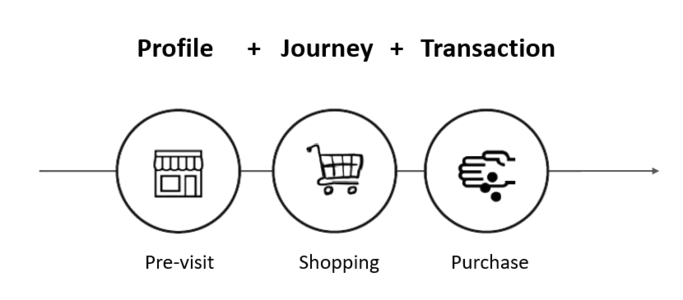Difference between revisions of "Smart Mall"
Jump to navigation
Jump to search
Profile Data: contains demographic information of the shopping mall members
Transaction Data: contains two months transnational records from January to February 2017
Wi-Fi Sensor Movement Data: contains two months Wi-Fi sensor records captured in the mall, which can be used to analyze the movement of customers
Maps: shopping mall layouts
Data Integration: bridge the three dataset to drive insights
R: Hexagonal binning using ggplot2 and Kernel Decimal Estimate using stat_Density2d
R: Chord diagram using chorddiag
R: Shinyapp, shinydashboard, flexdashboard
Zpchiam.2016 (talk | contribs) |
|||
| Line 10: | Line 10: | ||
<div style="text-align:left; padding-top:25px; font-family:Calibri;"> | <div style="text-align:left; padding-top:25px; font-family:Calibri;"> | ||
<font size = 5>Abstract</font> | <font size = 5>Abstract</font> | ||
| − | <br>Brick and Mortar retail malls are facing stiff challenge from online e-commerce shopping and mobile smartphone penetration. How can physical malls continue to survive under such conditions? How can shopping malls transform as part of the Smart Nation in Singapore? This project aims to explore the customers movement in the shopping mall using real data of a mega-mall using visual techniques for exploratory analysis to uncover patterns that may present opportunities for the mall as well as tenants to better optimise | + | <br>Brick and Mortar retail malls are facing stiff challenge from online e-commerce shopping and mobile smartphone penetration. How can physical malls continue to survive under such conditions? How can shopping malls transform as part of the Smart Nation in Singapore? This project aims to explore the customers movement in the shopping mall using real data of a mega-mall using visual techniques for exploratory analysis to uncover patterns that may present opportunities for the mall as well as tenants to better optimise operations, layout, events, maximize sales as well improve the customers' experience. |
</div> | </div> | ||
| Line 18: | Line 18: | ||
<li>Profile Data: contains demographic information of the shopping mall members</li> | <li>Profile Data: contains demographic information of the shopping mall members</li> | ||
<li>Transaction Data: contains two months transnational records from January to February 2017</li> | <li>Transaction Data: contains two months transnational records from January to February 2017</li> | ||
| − | <li>Wi-Fi Sensor Data: contains two months Wi-Fi sensor records captured in the mall, which can be used to analyze the movement of customers</li> | + | <li>Wi-Fi Sensor Movement Data: contains two months Wi-Fi sensor records captured in the mall, which can be used to analyze the movement of customers</li> |
<li>Maps: shopping mall layouts</li> | <li>Maps: shopping mall layouts</li> | ||
</div> | </div> | ||
Revision as of 12:12, 17 June 2017
ISSS608 Visual Analytics and Applications Project
Team S-MALL
Abstract
Brick and Mortar retail malls are facing stiff challenge from online e-commerce shopping and mobile smartphone penetration. How can physical malls continue to survive under such conditions? How can shopping malls transform as part of the Smart Nation in Singapore? This project aims to explore the customers movement in the shopping mall using real data of a mega-mall using visual techniques for exploratory analysis to uncover patterns that may present opportunities for the mall as well as tenants to better optimise operations, layout, events, maximize sales as well improve the customers' experience.
Data Description
Expected Outcome
Visualization Tool & Packages

